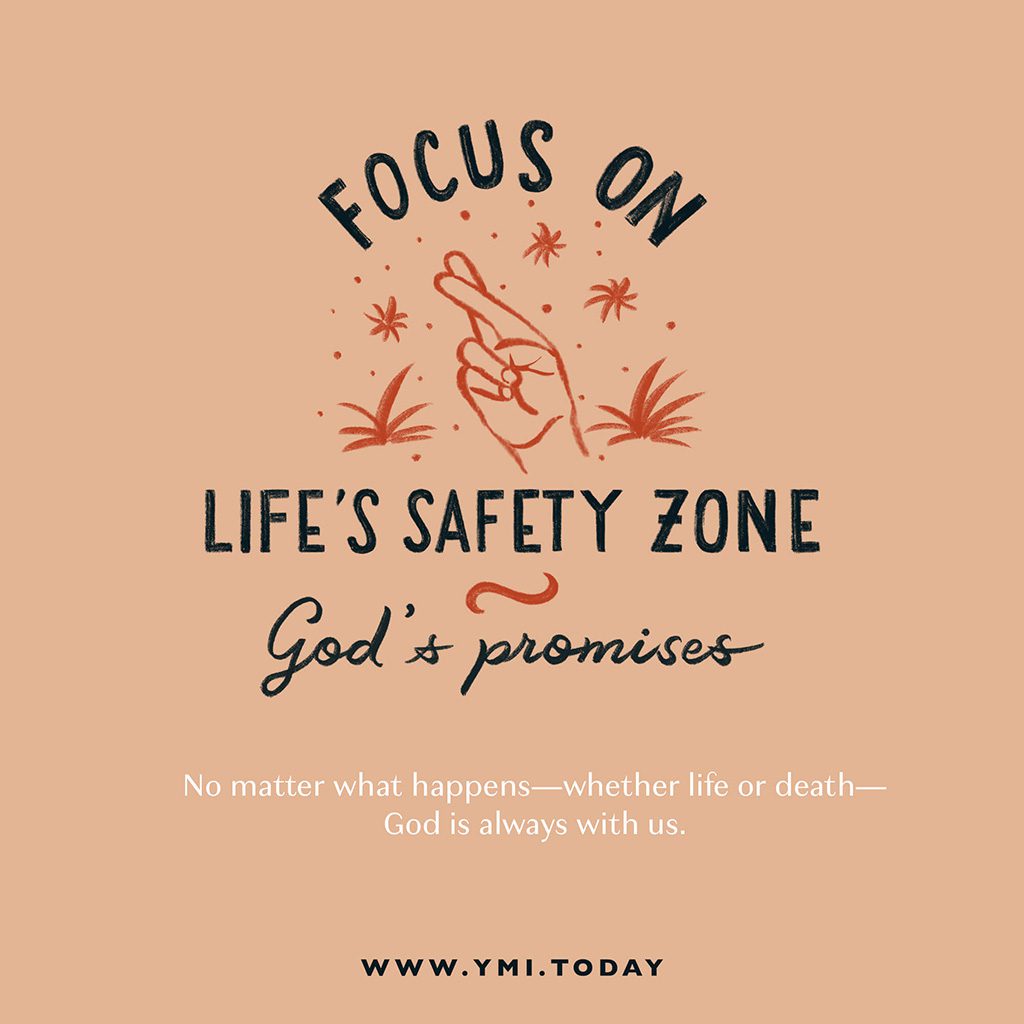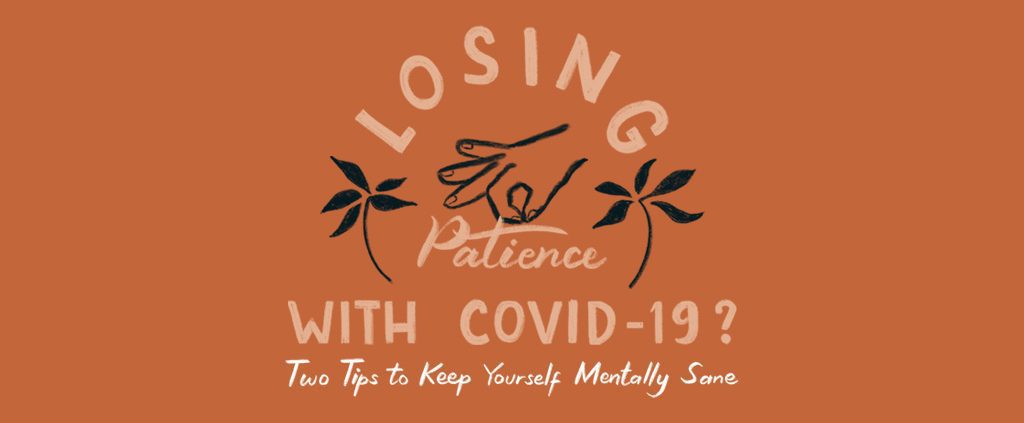Losing Patience with COVID-19? Two Tips to Keep Yourself Mentally Sane
Written by Lily Lin, Hong Kong, Originally in Traditional Chinese
It has been more than four months since the World Health Organization declared COVID-19 a global pandemic on 11 March 2020. Since then, there has been 13.4 million confirmed cases and more than 580,000 deaths, with no vaccine in sight.
Renowned Hong Kong infectious disease specialist, Professor Yuen Kwok Yung, predicts that COVID-19 will last for an estimated two to three years. Even if a vaccine is successfully developed, which might take some time, the virus will not disappear quickly. And if everyone would hoard these limited supplies as they did with the masks, it would take some time before the vaccine becomes widely available and accessible to all.
In addition, we’ve also seen some countries tightening social restrictions again after being hit with a second wave of cases over the past few weeks, which means that we’ll probably have to live with COVID-19 for a long time yet, and we must be prepared to fight this long-drawn battle against it.
As you think about these factors, perhaps you’re feeling anxious and uncertain, wondering when the pandemic will ever end or how it might continue to impact our lives as we’ve known it. If so, here are a few suggestions to help us remain mentally healthy as we wait for the traces of COVID-19 to completely disappear.

Focus on life’s safety zone—God’s promises
As countries begin easing lockdown restrictions in the coming weeks, perhaps one of the fears most of us have during this time, is the possibility that we—or our loved ones—might contract the virus.When I returned to Hong Kong from Mainland China at the end of January, I had developed mild flu symptoms. According to Hong Kong’s Department of Health guidelines then, I didn’t have to undergo testing. I could stay at home to rest and monitor my condition. In the first few days, I was worried that I had contracted the virus. I spent hours poring over related news on government websites and media. My fear kept me up at night.
What was I fearful of? As I reflected on my fears, Psalm 23:1-2 came to mind.
The Lord is my shepherd, I lack nothing. He makes me lie down in green pastures, he leads me beside quiet waters.
Indeed, God is my shepherd. No matter what happens—whether life or death—He is always with me. With that in mind, I began to feel more at ease.
I soon realized that many others with flu symptoms experienced false alarms as I did. The virus has spread worldwide, and unpredictably so. In time to come, whenever those around us and we ourselves develop the slightest symptoms, we will inevitably fear that we might be infected.
When faced with a highly infectious virus, it is natural for us to feel scared, anxious, and worried. Without these instincts, we will not persist in taking the necessary precautions. After all, wearing masks, going out less, and reducing social gatherings disrupt our daily activities.
However, I take heart in Bernie May’s experiences as a missionary pilot. He writes:
One of the most difficult lessons to teach new pilots about landing on short, hazardous airstrips is to keep their eyes on the good part of the strip rather than on the hazard. The natural tendency is to concentrate on the obstacle, the danger, the thing he is trying to avoid. But experience teaches us that a pilot who keeps his eye on the hazard will sooner or later hit it dead center.
Similarly, we will panic if we focus solely on the virus and its dangers, or fill ourselves up with bad news we pick up from media outlets and the stories around us. Our emotions may overwhelm us even before we are physically infected.
Instead, let’s focus on life’s safety zone—God’s promises—by reminding ourselves of what the Bible says. As Paul writes in Romans 8:38-39:
For I am convinced that neither death nor life, neither angels nor demons, neither the present nor the future, nor any powers, neither height nor depth, nor anything else in all creation, will be able to separate us from the love of God that is in Christ Jesus our Lord.
Despite how ruthless the virus is, God’s love for us doesn’t change.

Focus on what you can change
Like me, you probably thought that this outbreak would not last for long. I had assumed that we would be able to resume our normal lives by now. But looking at the current situation, the pandemic is unlikely to end soon. We have to learn to co-exist with it for a long time.
How then should we plan for our lives in the coming months, or even a year or two later?If we are merely waiting for the pandemic to end, or thinking about what we wish to do after it’s all over, we are likely to lose our patience. Our mental and emotional state will only deteriorate in the waiting. After all, the prolonged uncertainty is agonizing.
Professor Yuen offers an inspiring suggestion in this regard. Since the pandemic will last for a long time, we should persist in taking the necessary precautions, such as wearing our masks and washing our hands frequently even as we ease back into our normal lives. In other words, we must incorporate these preventive measures into our daily routines.
I have decided not to wait anxiously for my “normal” life to resume but to accept the changes that the virus has brought about in my life.
Firstly, I learned to regard these preventive measures, such as staying at home as much as possible and cooking my meals daily as an opportunity to live a healthier life, and be thankful for simple things such as being able to hug my husband, which I took for granted in the past.
As we are physically apart from our loved ones during this period, I proactively use communication technologies to keep in touch with my family and friends, and pray for them more often than before.
In addition, I no longer put off my medical consultations but follow through with the doctor’s recommended screenings, entrusting the entire procedure to God.
Finally, I enrolled in online courses to improve my professional skills, continuing my learning plan that was initially disrupted by the outbreak.
After doing these, the uncertainty of the pandemic no longer makes me anxious. Instead, I realized that life can still go on, and I have experienced God’s love and grace in the ordinary more than I did before the outbreak. I’ve become more patient and willing to wait upon God, focusing on the positive changes I can make, and believing that He is working in my heart as I pray.
Christian theologian and author Richard J. Foster writes in Prayer: Finding the Heart’s True Home:
We discover God in our waiting . . . In waiting we begin to get in touch with the rhythms of life—stillness and action, listening and decision. They are the rhythms of God. It is in the everyday and the commonplace that we learn patience, acceptance and contentment.
As we wait for the pandemic to end, may we focus on God’s promises and accept the changes that the pandemic has brought about in our lives—seeing them not as obstacles, but opportunities to draw closer to Him and to grow in Christ. When we do so, we can safeguard our mental health and strengthen our spiritual health as we battle against COVID-19.










Thanks for sharing this! Blessing:)